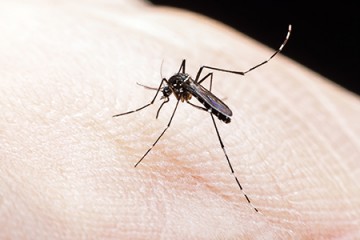A small survey of residents of a Florida Keys neighborhood finds a lack of support for the proposed insect control method of releasing genetically modified mosquitoes, according to new research from former and current students at the Johns Hopkins Bloomberg School of Public Health.
The findings, published last month in PLOS Currents Outbreaks, suggest that people's attitudes toward this new mosquito control method may be tied to their concerns about risks of contracting diseases including dengue, chikungunya, and Zika from the insects. The researchers say that people who do not feel that they are at risk from mosquito-borne diseases or who don't believe that mosquitoes are a nuisance express greater discomfort with the idea of the modified mosquitoes.
The novel population control method introduces male Aedes aegypti mosquitoes that have been bred to mate with wild females to produce offspring with a defective gene that kills them, thereby reducing the number of mosquitoes. The method has been tried in Brazil and Panama with some success, and the U.S. Food and Drug Administration is considering a trial in Key Haven, a community in the Florida Keys. Aedes aegypti carry all three diseases, though no local mosquito-borne cases of Zika virus have been reported in the United States.
The scientists—current students and recent graduates of the Bloomberg School—say the research could help public health and community leaders address the objections of residents where such control measures are being considered. The survey was conducted in the second half of 2015, after locally transmitted dengue and chikungunya cases had been discovered in Florida but before the full scope of the Zika epidemic in South and Central America was understood. Now, there is concern that Zika, which has been linked to birth defects and fetal death, could spread north into the continental U.S. and put the regions from southern Florida, including the Keys, to southern Texas and Hawaii at risk.
A British company, Oxitec, has been trying for years to get approval to test their genetically modified mosquitoes in the Florida Keys. Some local residents have tried to cancel the field trial, concerned about the unanticipated consequences of introducing lab-grown insects into the wild.
"With the start of mosquito season here and all of the media coverage of Zika, public health officials are going to be faced with important decisions about mosquitoes and how to best protect citizens," says Meghan McGinty, one of the researchers who recently received her PhD from the Bloomberg School. "People will have objections and it is critical for them to be heard. Our research provides a starting point to understand how the community feels and to begin a dialogue about how to address mosquito-borne diseases."
For the study, the researchers mailed a survey in July 2015 to all 456 households in the Key Haven community outside Key West; they received 89 responses. Residents were evenly split over whether they consider mosquitoes a nuisance, but two-thirds agreed there was a need to reduce the mosquito population.
The most popular mosquito control method was draining standing water to reduce breeding grounds, followed by treating standing water with larvicides designed to kill new mosquitoes before they hatch, and spraying insecticides.
Fifty-eight percent of respondents said they either "oppose" or "strongly oppose" the use of genetically modified mosquitoes to combat the risk of disease, making it the least popular proposed method of mosquito control. Women were more opposed to the genetically modified mosquitoes than men, and the most common objection was a concern over disturbing the local ecosystem by eliminating mosquitoes from the food chain. Respondents were also concerned that using genetically modified mosquitoes could lead to an increase in the use of other genetically modified products.
Since the survey was conducted before the extent of the Zika epidemic was widely reported, respondents were asked only about their concerns regarding dengue and chikungunya (the area was hit by a dengue outbreak several years ago). Sixty-three percent said they were "a little worried" or "very worried" about becoming sick from one of those mosquito-borne illnesses, and most said they or someone they knew would contract one of the diseases.
Researcher Crystal Boddie, a doctoral candidate in the Bloomberg School's Department of Health Policy and Management, says that those who were most concerned about the risk of contracting one of the mosquito-borne illnesses were more likely to support the release of the new mosquitoes.
The researchers recognize that their sample size is small and that with the rising threat of Zika, opinions may have changed about the use of these genetically modified mosquitoes.
Still, Boddie says, "the survey provides a baseline of information about residents' attitudes and concerns and can help health officials better educate the public about the risks and benefits of these genetically modified mosquitoes. Then we need to have an honest conversation about where this control method does—or does not—fit in."
Posted in Health, Politics+Society
Tagged zika virus











